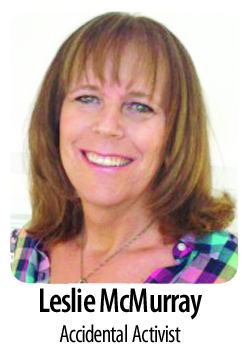What you say — or don’t say — can change someone’s life
 I haven’t seen John Vance in person in more than 30 years. Back in the mid-1980s, we worked together at a radio station in Ventura, Calif. We did the morning show — “McMurray and Vance” it was called. John became a good friend in the time we worked together.
I haven’t seen John Vance in person in more than 30 years. Back in the mid-1980s, we worked together at a radio station in Ventura, Calif. We did the morning show — “McMurray and Vance” it was called. John became a good friend in the time we worked together.
Ventura was a beach city about an hour north of Los Angeles. We would take lunch at a place called “China Bay Surf & Taco,” a hybrid surfboard store that also served food — the most amazing burritos and Ensenada-style fish tacos served by a guy from Puerto Rico.
China Bay had tile floors that were always sandy, because the beach was only a hundred yards or so from his door. Nobody wore shoes. It was run by Gil Sanchez, a feisty man built like a fire hydrant who loved the LA Raiders and had a heart of gold. Gil was like an uncle to us, and it was always an argument when we bought lunch, because Gil wouldn’t take our money.
Vance and I would eat lunch and solve the problems of the world. Radio in Ventura paid starvation wages, especially when you consider what it cost to live there. But I remember those days as being some of the best.
Around 1990, John and I went our own separate ways. I left for Sacramento and more money; John went back home to Minnesota and became a fire fighter.
We still touch base from time to time. John is now the chief of the Minnetonka Fire Department. What an accomplishment! I don’t know the guys in his department, but I would bet everything I have that they love him.
When I transitioned about seven years ago, it was no big thing. He was happy for me, and aside from using a different name and pronouns, our relationship has not changed a bit. Vance has a little of that Fargo (if you’ve seen the movie) midwestern accent and an easy laugh. And John Vance has never met a stranger.
 I follow John and the Minnetonka Fire Department on Twitter. They are often posting pictures of fires or calls they have been on or of kids touring fire stations. They often just post photos of cool things they are doing in the community.
I follow John and the Minnetonka Fire Department on Twitter. They are often posting pictures of fires or calls they have been on or of kids touring fire stations. They often just post photos of cool things they are doing in the community.
Recently, I shared a picture and story from a fire department where, after firefighters responded to a call for medical aid, completed, a few of the guys stayed behind to help an elderly man at the apartment complex move some heavy items into a moving truck. I tagged Vance and said, “I saw this and thought of you.”
He responded: “We (the FD) are really in the customer service business. We try to do the same — our people have shoveled snow off driveways and finished mowing lawns. I remember that book you gave me about Nordstrom and customer service.
My philosophy on FD customer service started then. (Thank you!)”
I hadn’t thought of that book in ages.
This is one of those reminders that the things you say to people can have effects that you can’t possibly imagine at the time.
The book I was referencing was by Tom Peters, and, among many other things, it spoke of the obsessive customer service that Nordstrom was/is known for. John and I had talked about how that concept can be translated to nearly any business.
John took that conversation to heart, and look at the legacy he has begun, far from Ventura where we met.
I’ve had the same thing happen in my life. A mentor of mine gave me several pieces of advice that I’ve taken with me and passed along. One vital piece of advice was to separate the urgent from the important. Especially in the age of multiple digital platforms all with “urgent” messages crying for attention, it’s easy to forget the “important” stuff.
Sometimes “urgent” just has to wait.
The message here is to use care and intention when we talk to others. Sometimes the right encouragement at the right time can last a lifetime or change a life.
On Sept. 25, 2000, Kevin Hines jumped off of the Golden Gate Bridge. He had dropped his classes at City College of San Francisco and then hopped on a bus to the bridge, sitting in the back of the bus and crying openly.
He said, “I actually had a pact with myself — this is something that many suicidal people do: If one person were to say,
“Are you ok?’ ‘Is something wrong?’ Or ‘Can I help you?’ I was going to tell them everything beg them to help me.”
But no one spoke to him.
Hines survived his leap that day, but I really wish someone had said something kind to that desperate 19-year-old kid.
The fact is, words matter. They cost you nothing, but they can and do save and change lives. We are all living proof, for better or worse.
Leslie McMurray, a transgender woman, is a former radio DJ who lives and works in Dallas. Read more of her blogs at lesliemichelle44.wordpress.com.

Brava, Leslie. What a marvelous piece!
Excellent article. Makes you think about how you engage people throughout your day.
Makes me wonder how many people I have failed. Thank you for the heads-up!